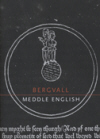Meddle English
Bergvall’s bio is worth reading before engaging with Meddle English, and I say engaging (rather than reading) because this isn’t a book one reads in a traditional sense, but more like a book to be considered. Here’s the first paragraph of the poet’s page-long bio:
Bergvall’s bio is worth reading before engaging with Meddle English, and I say engaging (rather than reading) because this isn’t a book one reads in a traditional sense, but more like a book to be considered. Here’s the first paragraph of the poet’s page-long bio:
Caroline Bergvall is an international writer who works across media, languages and artforms. French-Norwegian, currently based in London. She grew up in Switzerland, Norway and France with longer periods in the US and England. Projects and research alternate between published writings pieces and performance-oriented, often sound-driven language projects. Her books….are noted for their combination of performative, visual and literary textualities.
This book is consistent with the poet’s announced preoccupations and tendencies. It is clearly a “project”; a mix of “textualities” is an essential characteristic of Meddle English; and sound is critical—the English of Chaucer, the sound of which is rendered in an appropriate form, as in these lines from the first poem in the book: “The fruyt of every tale is for to seye; They ete, and drynky, and daunce, and synge, and pleye.”
In a lengthy introductory essay, Bergvall explains the book’s journey through the development of the English language: “I would like to make four points. Four short points about Middling English. The point about the midden. The point about the middling. The point the middle. The point the meddle. The midden, the middling, the middle, the meddle.” She subsequently explains each of these with multiple historic references, poetic musings related to grammar, and personal revelations: “My personal sense of linguistic belonging was not created by showing for the best English I can speak or write, but the most flexible one. To make and irritate English at its epiderm, and at my own.”
Flexibility and irritation of the skin of the English language manifest as lines of type of upper case letters; lines of barely legible reverse type; poems in the style of the language of Chaucer; pages composed of a single letter in tiny type; and a variety of other permutations of physical and abstract elements. A prose-poem-like section titled “untitled” is subtitled “homage to Inger Christensen.” Christensen was an extraordinary Danish poet whose work certainly could be read as an inspiration for this section of the book, a lyrical elaboration on objects that serves as a jumping off point for a commentary on social and linguistic realities.
I was fascinated by “Crop,” a prose-poem essay (for lack of better terminology) composed of lines in multiple languages (I refer you back to the author’s bio). And many of the pieces that may seem impenetrable at first, turn out to be similarly fascinating, and comprehensible, on a second or third reading.
I am compelled to seye that Meddle English is essentially an original and exciting treatise on how language works: “A lingual event is taking place, not in the voice but in the clearing of the throat,” the poet writes in “Cat in the Throat.” And, as such, it is a marvelous, inventive, and highly successful project. But, it is, nonetheless, a project. And like many projects, I suspect it was, ultimately, at least—if not more—more meaningful to dream up and create than to read.




